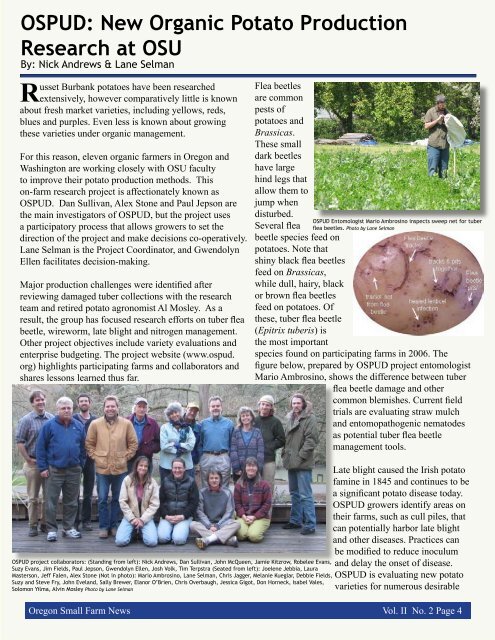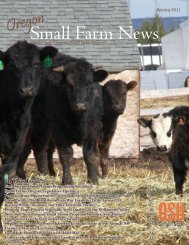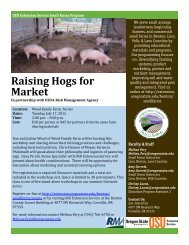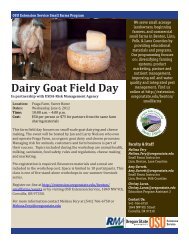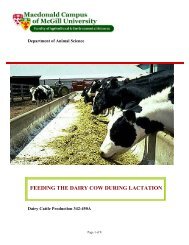Small Farm News - Oregon Small Farms - Oregon State University
Small Farm News - Oregon Small Farms - Oregon State University
Small Farm News - Oregon Small Farms - Oregon State University
You also want an ePaper? Increase the reach of your titles
YUMPU automatically turns print PDFs into web optimized ePapers that Google loves.
OSPUD: New Organic Potato Production<br />
Research at OSU<br />
By: Nick Andrews & Lane Selman<br />
Russet Burbank potatoes have been researched<br />
extensively, however comparatively little is known<br />
about fresh market varieties, including yellows, reds,<br />
blues and purples. Even less is known about growing<br />
these varieties under organic management.<br />
For this reason, eleven organic farmers in <strong>Oregon</strong> and<br />
Washington are working closely with OSU faculty<br />
to improve their potato production methods. This<br />
on-farm research project is affectionately known as<br />
OSPUD. Dan Sullivan, Alex Stone and Paul Jepson are<br />
the main investigators of OSPUD, but the project uses<br />
a participatory process that allows growers to set the<br />
direction of the project and make decisions co-operatively.<br />
Lane Selman is the Project Coordinator, and Gwendolyn<br />
Ellen facilitates decision-making.<br />
Major production challenges were identified after<br />
reviewing damaged tuber collections with the research<br />
team and retired potato agronomist Al Mosley. As a<br />
result, the group has focused research efforts on tuber flea<br />
beetle, wireworm, late blight and nitrogen management.<br />
Other project objectives include variety evaluations and<br />
enterprise budgeting. The project website (www.ospud.<br />
org) highlights participating farms and collaborators and<br />
shares lessons learned thus far.<br />
Flea beetles<br />
are common<br />
pests of<br />
potatoes and<br />
Brassicas.<br />
These small<br />
dark beetles<br />
have large<br />
hind legs that<br />
allow them to<br />
jump when<br />
disturbed.<br />
Several flea<br />
OSPUD project collaborators: (Standing from left): Nick Andrews, Dan Sullivan, John McQueen, Jamie Kitzrow, Robelee Evans,<br />
Suzy Evans, Jim Fields, Paul Jepson, Gwendolyn Ellen, Josh Volk, Tim Terpstra (Seated from left): Joelene Jebbia, Laura<br />
Masterson, Jeff Falen, Alex Stone (Not in photo): Mario Ambrosino, Lane Selman, Chris Jagger, Melanie Kueglar, Debbie Fields,<br />
Suzy and Steve Fry, John Eveland, Sally Brewer, Elanor O’Brien, Chris Overbaugh, Jessica Gigot, Don Horneck, Isabel Vales,<br />
Solomon Yilma, Alvin Mosley Photo by Lane Selman<br />
OSPUD Entomologist Mario Ambrosino inspects sweep net for tuber<br />
flea beetles. Photo by Lane Selman<br />
beetle species feed on<br />
potatoes. Note that<br />
shiny black flea beetles<br />
feed on Brassicas,<br />
while dull, hairy, black<br />
or brown flea beetles<br />
feed on potatoes. Of<br />
these, tuber flea beetle<br />
(Epitrix tuberis) is<br />
the most important<br />
species found on participating farms in 2006. The<br />
figure below, prepared by OSPUD project entomologist<br />
Mario Ambrosino, shows the difference between tuber<br />
flea beetle damage and other<br />
common blemishes. Current field<br />
trials are evaluating straw mulch<br />
and entomopathogenic nematodes<br />
as potential tuber flea beetle<br />
management tools.<br />
Late blight caused the Irish potato<br />
famine in 1845 and continues to be<br />
a significant potato disease today.<br />
OSPUD growers identify areas on<br />
their farms, such as cull piles, that<br />
can potentially harbor late blight<br />
and other diseases. Practices can<br />
be modified to reduce inoculum<br />
and delay the onset of disease.<br />
OSPUD is evaluating new potato<br />
varieties for numerous desirable<br />
<strong>Oregon</strong> <strong>Small</strong> <strong>Farm</strong> <strong>News</strong> Vol. II No. 2 Page 4


